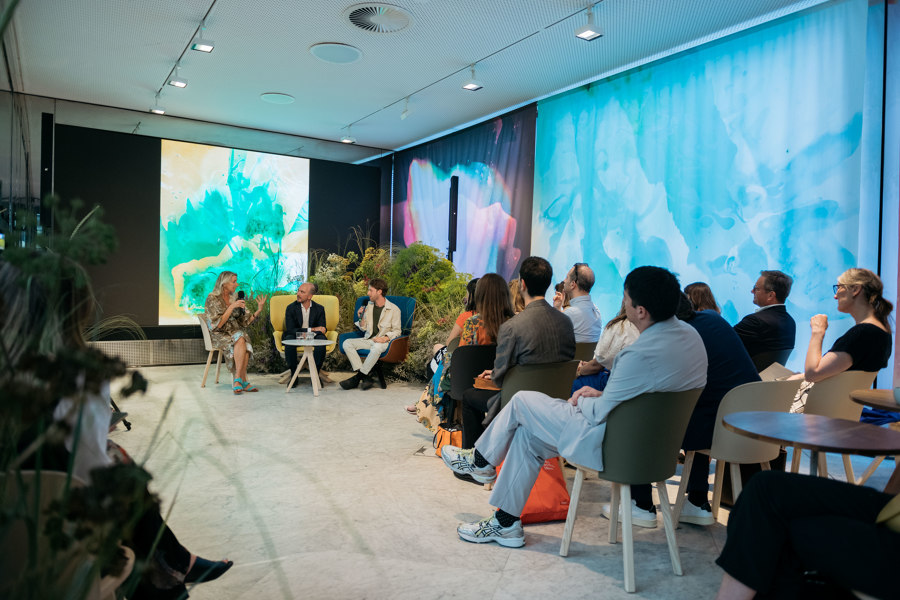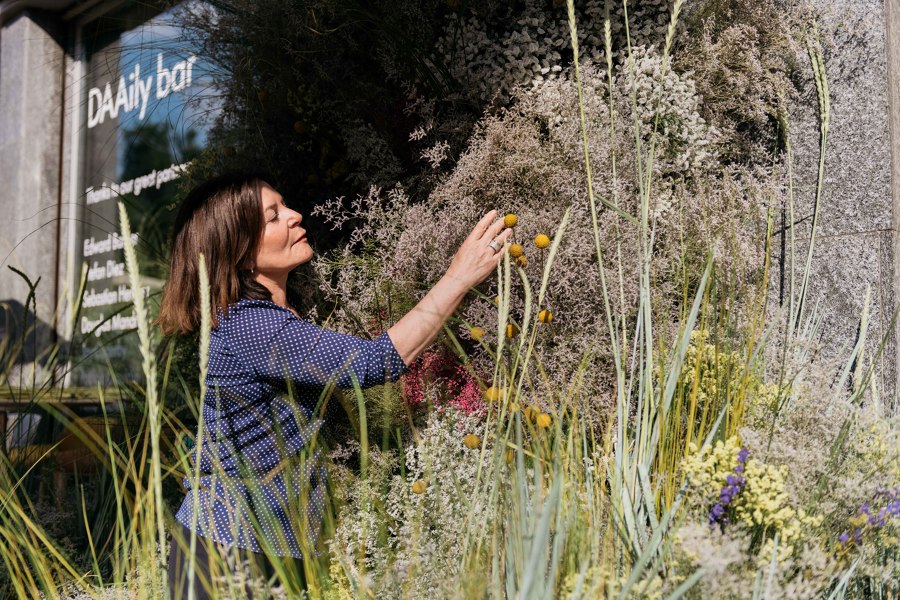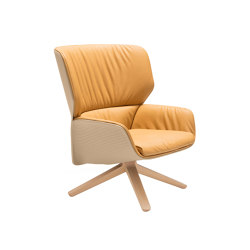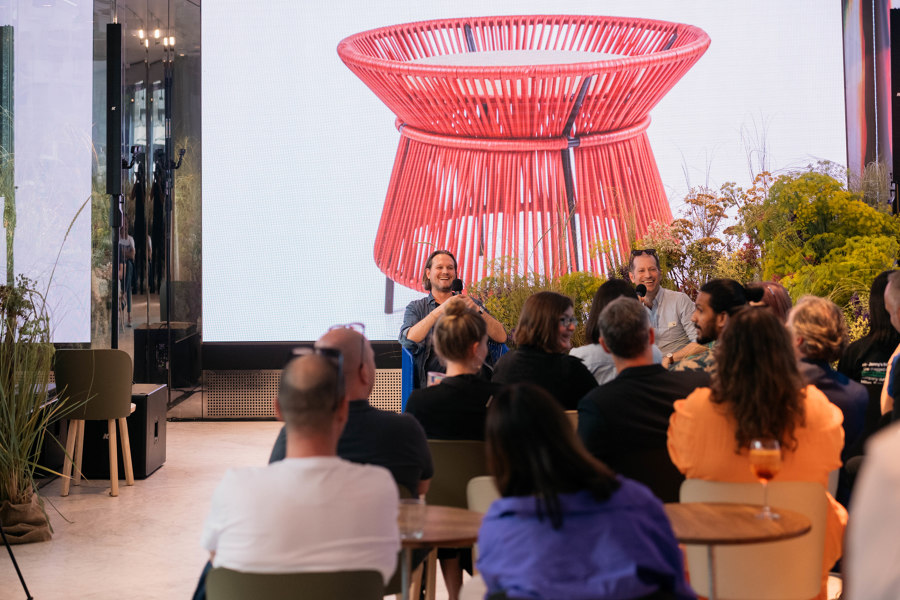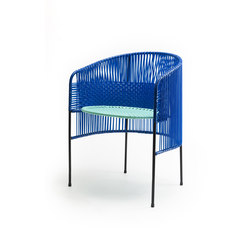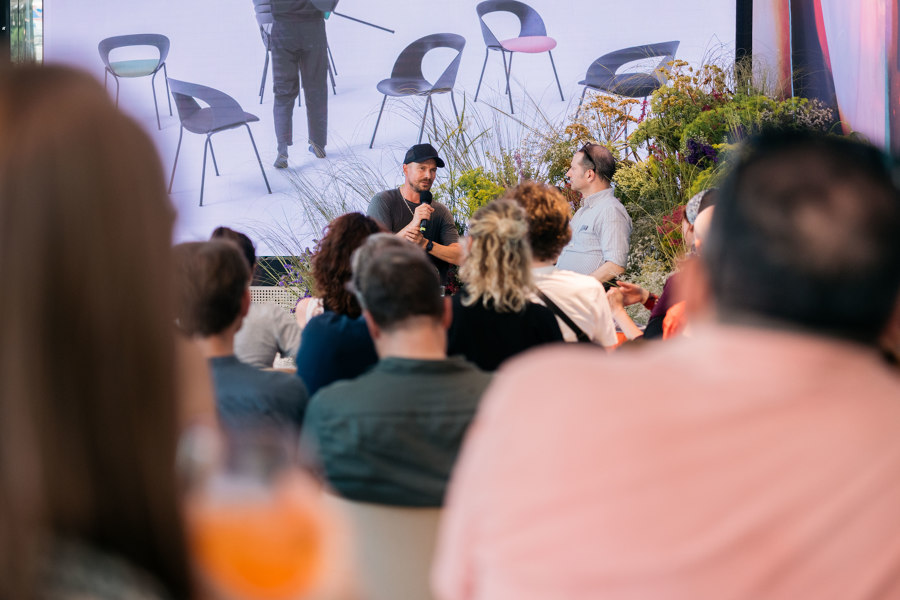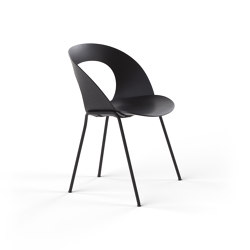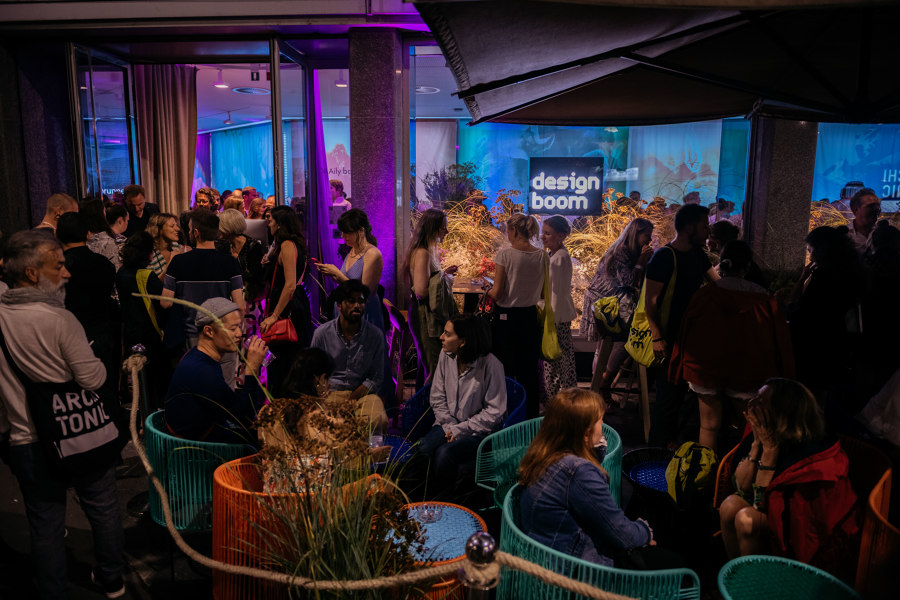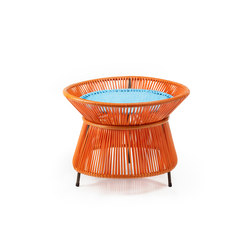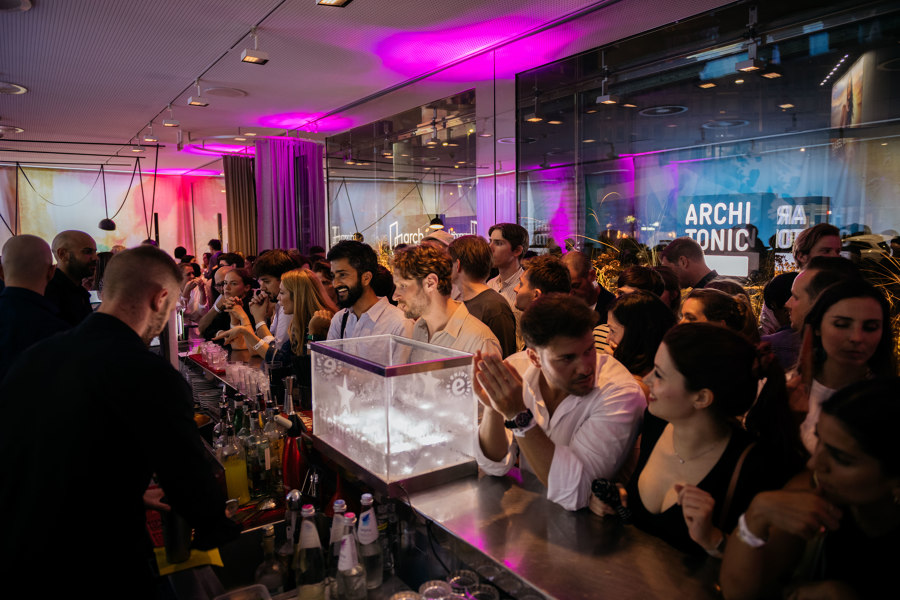The DAAily bar: a new stage at Milan Design Week for DAAily platforms
Texte par James Wormald
23.06.22
Bringing Designboom, Architonic and ArchDaily together in a single physical space for the first time, the DAAily bar served up A&D inspiration in Milan, along with food – and drinks – for thought.
Milano, how we’ve missed you! With four days of engaging, insightful and inspiring live talks, along with a rocking party to rival DAAily’s notorious history of rocking parties, it’s good to be back!
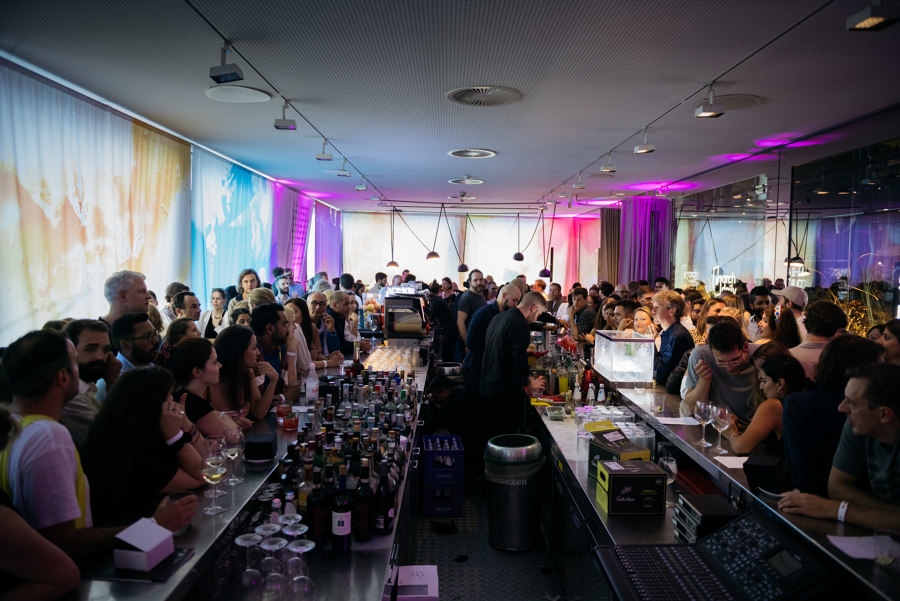
Milano, how we’ve missed you! With four days of engaging, insightful and inspiring live talks, along with a rocking party to rival DAAily’s notorious history of rocking parties, it’s good to be back!
×Stepping out in a new outfit for the first time always fills one with nervous excitement. Leaving the comfort and sanctuary of your private preparation space, you’re filled with pride and confidence, yet still with a niggling concern about how others will see you. For its first physical outing as a threesome, DAAily platforms chose Milan Design Week, the international design festival to top all international design festivals, as its stage, and the nature-inspired DAAily bar at Swiss Corner as its outfit.
While visitors could take a load off outside, the DAAily bar also featured an energising floral installation (middle, bottom) and thought-provoking artwork from Douglas Mandry (top). Photos: ©José Salto FELICES Agency
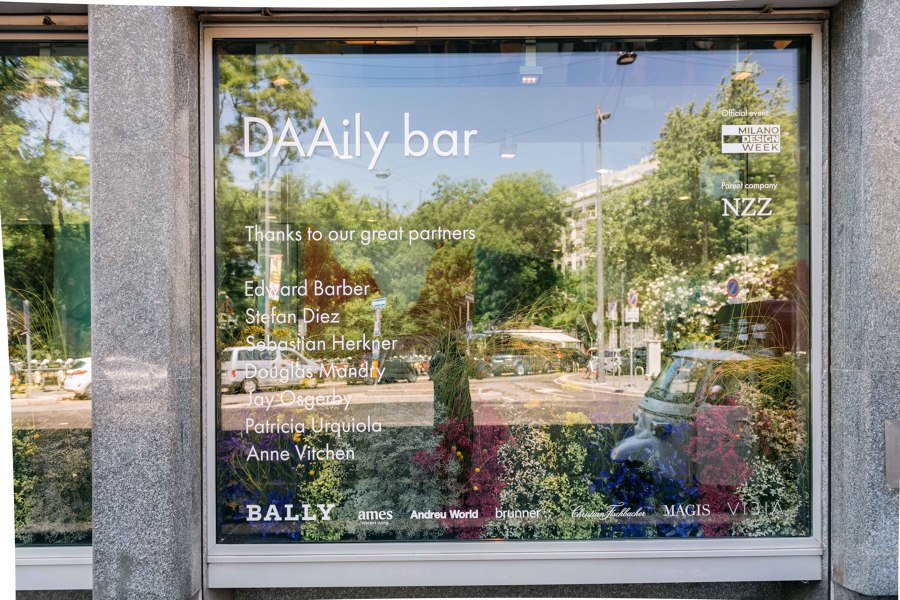
While visitors could take a load off outside, the DAAily bar also featured an energising floral installation (middle, bottom) and thought-provoking artwork from Douglas Mandry (top). Photos: ©José Salto FELICES Agency
×The DAAily bar
Barely containing a poetic floral installation by The Ritz Paris’ Lady of the Flowers Anne Vitchen, the bar’s shop window allowed Vitchen’s organic environment to seep through and encase the outdoor seating area too, while creating a delightfully natural three-dimensional backdrop inside as well.
Pitched between this and the thoughtful Art Curtain Wall, meanwhile – itself by the Swiss artist Douglas Mandry and sponsored by Bally and Fischbacher 1819, featuring engaging imagery literally created by climate change – was a stage for those with creative curiosities of all kinds to address their attention.
Paola Antonelli and Alice Rawsthorn sit on Patricia Urquiola’s Nuez Bio chairs while discussing their book ‘Design Emergency’ with Designboom editor-in-chief Birgit Lohmann. Photo: ©José Salto FELICES Agency
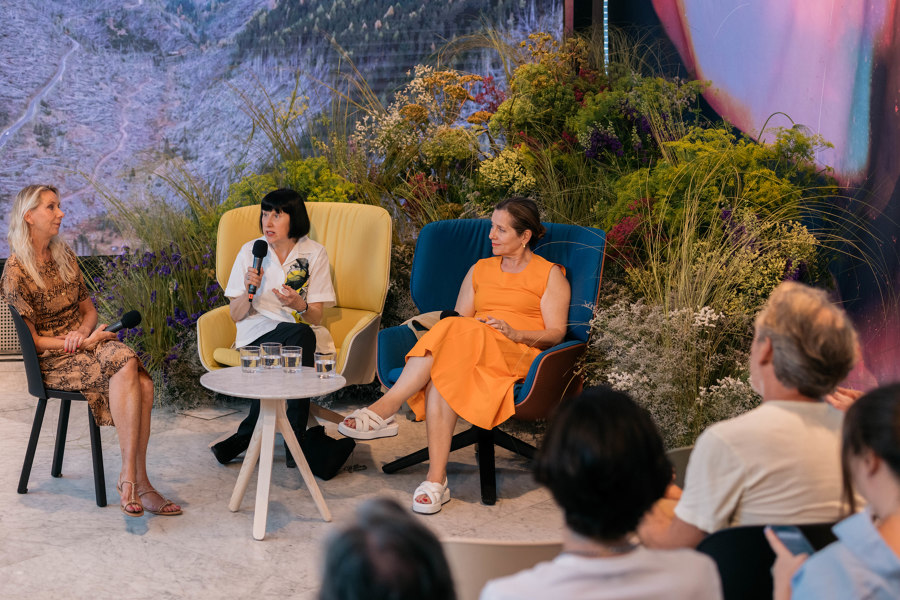
Paola Antonelli and Alice Rawsthorn sit on Patricia Urquiola’s Nuez Bio chairs while discussing their book ‘Design Emergency’ with Designboom editor-in-chief Birgit Lohmann. Photo: ©José Salto FELICES Agency
×Sustainable focus
Along with the DAAily bar's decor, sustainability and the environment were also a huge part of the main themes discussed at the space's Live Talk programme. One of the most popular speakers of the week, for example, was Patricia Urquiola. Introducing her Nuez Bio chair family for Andreu World – which features a fully compostable shell, moulded from bio-polymer – the renowned designer discussed the material innovations allowing manufacturers to avoid the compromise between quality, longevity and sustainability.
The Live Talk schedule featured Sebastian Herkner on his joyful Caribe collection (top) and Stefan Diez (bottom) discussing his Mudra chair's unending life cycle (middle). Photos: ©José Salto FELICES Agency
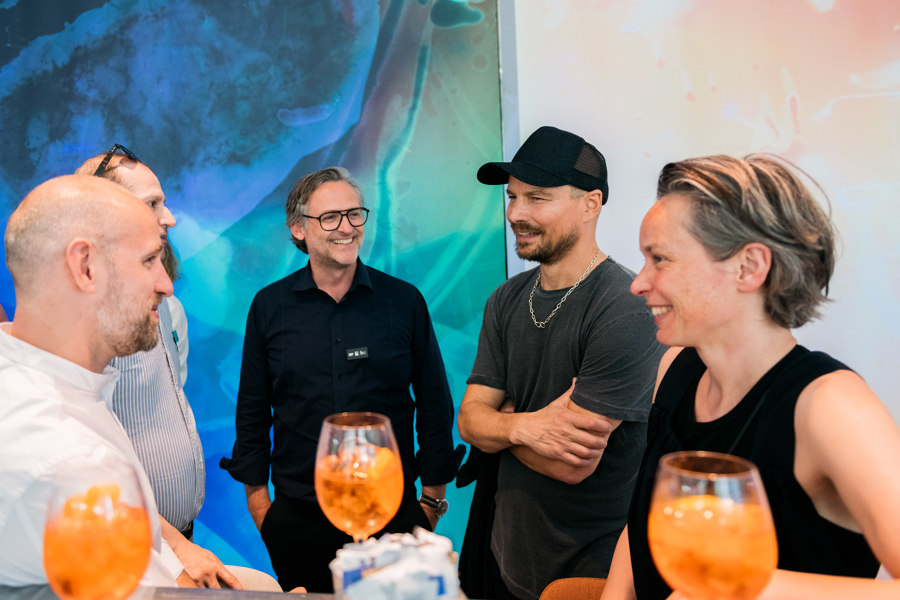
The Live Talk schedule featured Sebastian Herkner on his joyful Caribe collection (top) and Stefan Diez (bottom) discussing his Mudra chair's unending life cycle (middle). Photos: ©José Salto FELICES Agency
×DAAily bar’s Live Talk: Stefan Diez
Amongst the bar’s many other highlights, the four days of live talks included DAAily platforms editors-in-chiefs in discussion with more huge industry names like Alfredo Häberli, Carlo Ratti and Stefan Diez. Perched on a couple of Diez’s Mudra chairs, designed for Brunner, the designer, together with Architonic editor-in-chief Simon Keane-Cowell spoke about the surprising linearity of the chair’s circular lifecycle, created to be fully and continuously serviceable rather than directing its circled materials around in an endless but lengthy loop.
'Obsolescence is the core of the business model of the old economy'
‘Obsolescence is the core of the business model of the old economy. If a product breaks after just a few years, you don’t blame the seller, but just say ‘it’s OK’ and buy a new one. That creates a turnover that runs the economy.’ explained Diez, frustratingly, commenting on manufacturers’ previous seductive use of virgin materials and cheap labour to feed consumers’ unending craving for shiny new objects. As Diez was able to explain, Mudra’s continued serviceability encourages an ongoing relationship between consumer, retailer and a single product, thus extending the product’s lifecycle, theoretically indefinitely.
Set to host DAAily platforms' presence at Milan Design Week for years to come, Swiss Corner became the perfect venue, combining architecture, design, art and nature. Photos: ©José Salto FELICES Agency
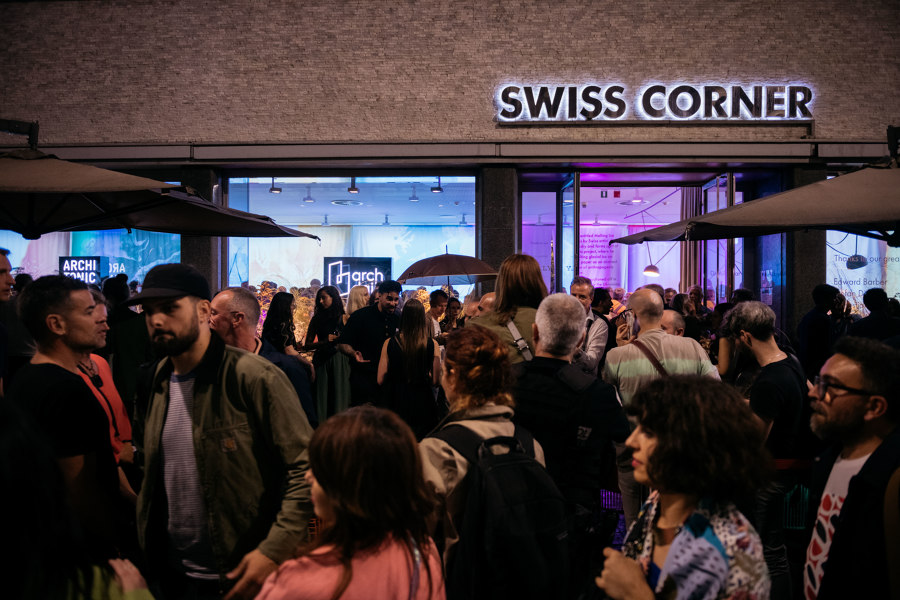
Set to host DAAily platforms' presence at Milan Design Week for years to come, Swiss Corner became the perfect venue, combining architecture, design, art and nature. Photos: ©José Salto FELICES Agency
×DAAily bar's Live Talk: Sebastian Herkner
As part of the second day’s Live Talk programme, Simon Keane-Cowell, together with Sebastian Herkner, discussed the designer’s new Caribe collection for ames, a brand that, as Herkner explained, ‘uses the materials, the knowledge, the crafts and the story of Colombia to bring something back to the world.’
'I bought an NFT artwork in Berlin and I haven’t been able to download it for two weeks’
Featured in the DAAily bar’s outdoor seating area, the collection has a joyful design and colour scheme that reflects the character of Colombians as a people and a culture. The outdoor lounge chairs and tables, inspired by and manufactured in Colombia, use traditional craftsmanship that’s been passed down for generations. ‘I met a lot of young people, not [previously] interested in crafts but learning from parents and grandparents,’ explained Herkner, ‘who now really appreciate their craft, making things you can find in concept stores in Paris and seeing that other cultures and nations have a respect for their work.’
Both the DAAily bar's floral installation and art curtain put the sustainability of design, architecture and production into focus, common themes for discussion. Photo: ©José Salto FELICES Agency
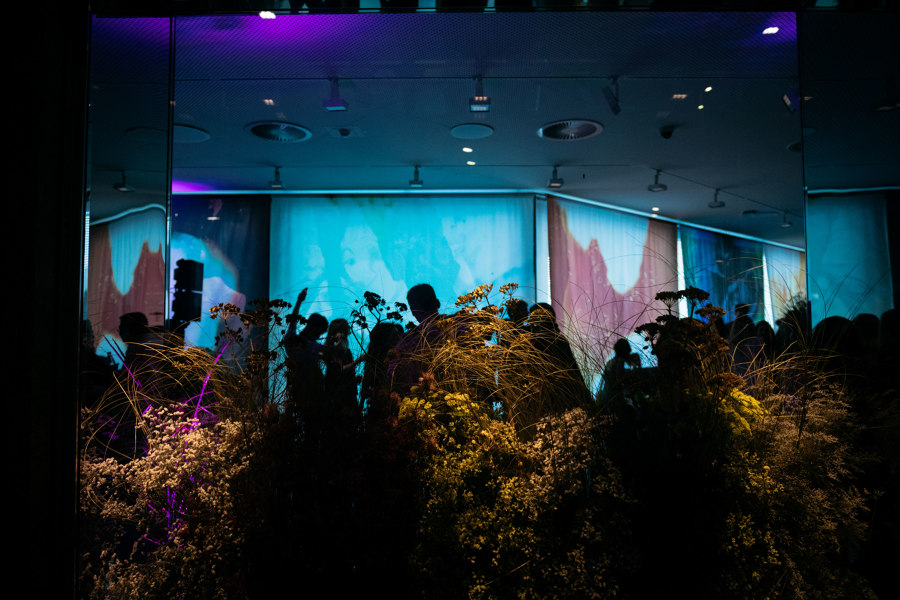
Both the DAAily bar's floral installation and art curtain put the sustainability of design, architecture and production into focus, common themes for discussion. Photo: ©José Salto FELICES Agency
×In a physical sense
‘I bought an NFT artwork in Berlin and I haven’t been able to download it for two weeks,’ quipped Herkner, ‘It’s a nightmare! I don’t know if I will ever get it.’ Discussing the importance of being able to see and touch things in the flesh – or recycled plastic in the case of his Caribe collection – as opposed to the emergence of products designed, built and interacted with only in digital format, he shared ‘I think it’s so important to meet and be able to grab things and use all the senses.’
In this sense, both the Caribe collection and the DAAily bar share something important in common: that people – whether after years of cancelled and postponed events and cultural meet-ups, or weeks spent waiting for elusive NFT artworks – strive for physical contact, with furniture as well as other humans.
© Architonic

